- Home
- Robert Goddard
Play to the End
Play to the End Read online
PLAY TO
THE END
ROBERT GODDARD
DELTA TRADE PAPERBACKS
CONTENTS
TITLE PAGE
DEDICATION
EPIGRAPH PAGE
SUNDAY
MONDAY
TUESDAY
WEDNESDAY
THURSDAY
FRIDAY
SATURDAY
SUNDAY
LATER DAYS
ACKNOWLEDGEMENTS
ALSO BY ROBERT GODDARD
SIGHT UNSEEN by Robert Goddard
COPYRIGHT
For
Marcus Palliser
1949–2002
Sailor, writer, debater, debunker and much missed friend
A transcription of tape recordings made in Brighton during the first week of December 2002.
SUNDAY
What I felt as I got off the train this afternoon wasn’t what I’d expected to feel. The journey had been as grim and tardy as I suppose it was bound to be on a December Sunday. Most of the others have chosen to go via London and they won’t be coming down here until tomorrow. I could have joined them. Instead I volunteered for the slow South Central shuffle along the coast. I had plenty of opportunity to analyse my state of mind as a seamless succession of drab back gardens drifted past the grimy train window. I knew why I hadn’t gone up to London, of course. I knew exactly why bright lights and brash company weren’t what the doctor had ordered. The truth is that if I had fled to the big city, I might never have made it to Brighton at all. I might have opted out of the last week of this ever more desperate tour and let Gauntlett sue me if he could be bothered to. So, I came the only way I could be sure would get me here. Which it did. Late, cold and depressed. But here. And then, as I stepped out onto the platform…
That feeling is why I’m talking into this machine. I can’t quite describe it. Not foreboding, exactly. Not excitement. Not even anticipation. Something slipping between all three, I suppose. A thrill; a shiver; a prickling of the hairs on the back of the neck; a ghost tiptoeing across my grave. There wasn’t supposed to be anything but a protraction of a big disappointment waiting for me in Brighton. But already, before I’d even cleared the ticket barrier, I sensed strongly enough for certainty that there was more than that preparing a welcome for me. More that might be better or worse, but, either way, was preferable.
I didn’t trust the sensation, of course. Why would I? I do now, though. Because it’s already started to happen. Maybe I should have realized sooner that the tour was a journey. And this is journey’s end.
The tapes were my agent’s idea. Well, a diary was what she actually suggested, back in those bright summer days when this donkey of a play looked like a stallion that could run and run and the mere prospect merited a lunch at the River Café. A chronicle of how actors refine their roles and discover the deeper profundities of a script before they reach the West End is what Moira had in mind. She reckoned there might be a newspaper serialization in it to supplement the two thou a week Gauntlett is ever more reluctantly paying me. It sounded good. (A lot of what Moira says does.) I bought this pocket audio doodah on the strength of it, while the Cloudy Bay was still swirling around my thought processes. I’m glad I did now.
But it’s more or less the first time I have been. I abandoned the diary before I’d even started it, up in Guildford, where the Yvonne Arnaud Theatre hosted the world première of our proud production. Is it only nine weeks ago? It feels more like nine months, the span of a difficult pregnancy, with a stillbirth the foregone conclusion since we had word from Gauntlett that there was to be no West End transfer. I thank God for the panto season, without which he might have been tempted to keep us on the road in the hopes of some magical improvement. As it is, the curtain comes down next Saturday and seems likely to stay there.
It shouldn’t have turned out this way. When it was announced last year that a previously unknown play by the late and lauded Joe Orton had been discovered, it was widely assumed to be a masterpiece on no other basis than its authorship. What greater proof was needed, after all? This was the man who gave us Entertaining Mr. Sloane, Loot and What the Butler Saw. This was also the man who sealed his reputation as an anarchic genius by dying young, murdered by his lover, Kenneth Halliwell, at their flat in Islington in August 1967. I have all the facts of his extraordinary life at my fingertips thanks to carting his biography and an edition of his diaries around with me. I thought they might inspire me. I thought lots of things. None of them have quite worked out.
The script of Lodger in the Throat was found by a plumber under some floorboards in the flat where Orton and Halliwell used to live. I imagine Orton would have been amused by the circumstances of its discovery. Maybe he actually planted it there as a joke. Or maybe—my preferred theory—Halliwell hid it during the final phase of his mental disintegration, not long before he bashed Orton’s brains out with a hammer and then killed himself by swallowing a fatal quantity of Nembutal tablets. The Orton experts date the play to the winter of 1965/66 and reason he gave up on it when Loot was revived after a disastrous initial tour. Now I come to think about it, that tour bore eerie similarities to the experiences of the cast I’ve been trying to lead this autumn. Loot worked second time around, of course, because Orton was alive and well and willing to revise it. The irony is that he’s not available to salvage Lodger in the Throat, the play he consigned to a bottom drawer (or maybe the floor-space) in order to return to Loot. We’re on our own. And, boy, does it feel like it.
Enough about the play. We’ve analysed its potential and its problems, my fellow performers and I, till we’re sick of the subject. Sick and tired. It was supposed to put my career back on the rails, or at any rate haul it out of the siding into which it was unaccountably shunted a few years ago. I’m the man who was in with a chance of being the new James Bond when Roger Moore packed it in, something I now find hard to believe, even though I know it’s true. What’s also true is that you don’t realize you’ve stopped going up until you start going down.
There are plenty of signs if you’re smart enough to spot them, of course, or if you’re willing to let yourself spot them. My name tops the bill, but Martin Donohue, who plays the part of my younger brother, has somehow managed to emerge from our dismal run with enough credit to make my primacy look shaky if we were ever cast together again—which, naturally, I’d move heaven and earth to prevent. Time was when Mandy Pringle, our ambitious deputy stage manager, would have set her sights on me, not Donohue. But that time is past. Not long past, but past none the less. Maybe they’re looking forward to a week in Brighton. What they certainly won’t be thinking is that I’m looking forward to our week in Sussex by the Sea. But I am. At least, I am now.
It rained all last night in Poole and was still raining when I got on the train this morning. Brighton must have caught the deluge too, but it was dry when I left the station and trudged south along Queen’s Road through the mild grey dusk towards the darker grey slab of the sea. I’d already written off my weird presentiment. I’d accepted the exact and unappetizing character of the next six days. And the idea of making any kind of a record of them was about as remote as it could be.
I turned east along Church Street, a fair enough route to take to my destination, but one that also permitted a detour along New Road, past the familiar period frontage of the Theatre Royal. This will be my fourth professional engagement on its antique boards and I’d happily swap any one of the others for the eight renderings of Lodger in the Throat that the near future holds.
I stopped and examined the poster, wondering whether I’d visibly aged since the photograph was taken three months ago. It was hard to tell, not least because I haven’t been taking any lingering looks at myself
in the mirror lately. But it was me all right. And there was my name, listed with the others, to prove it. Leo S. Gauntlett presents Lodger in the Throat, by Joe Orton, starring Toby Flood, Jocasta Haysman, Martin Donohue, Elsa Houghton and Frederick Durrance, Monday 2 to Saturday 7 December. Evenings at 7.45 p.m. Thursday and Saturday matinées at 2.30 p.m. Part of me longed to see a CANCELLED sticker across the poster, but it wasn’t there and it isn’t going to be. We’re on. There’s no way out. Until the end of the week.
I didn’t linger, cutting round by the Royal Pavilion to the Old Steine, then heading east along St. James’s Street. The Sea Air Hotel is neither the chicest nor the cheapest B & B establishment in Madeira Place, one of the guesthouse-filled streets running down to Marine Parade, but Eunice is as actor-friendly a landlady as they come, willing to suspend her winter closure just for me. As the tour’s gone from bad to worse and the play’s immediate future has shrunk, I’ve started economizing on accommodation in order to have some dosh to show for my efforts even if kudos is out of the question. I’d probably have opted to stay with Eunice anyway, but just now the Sea Air has a number of crucial advantages apart from the tariff, principal among them being the fact that none of the others will be staying here. I have Eunice’s word on it. “I couldn’t cope with a party, Toby. All that coming and going. All that bathwater. I reckon you’ll do for me.”
I’ve only ever been here out of season, to share the dining room with the ghosts of summer holidaymakers. It’s a peaceful house, thanks to Eunice’s serene temperament and aversion to noise of all kinds. Even Binky, her cat, has learned not to purr loudly. Eunice is Mrs. Rowlandson, complete with wedding and engagement rings, but Mr. Rowlandson is a subject never touched upon, sometime existence presumed but fate unspecified. It’s true to say, mind you, that Eunice might not be able to discard the rings even if she wanted to. A thin woman she is not. And less thin than ever. An aroma of baking wafted up from her basement flat as she ushered me into the speckless, flock-papered hall and up the Axminster-carpeted stairs to the first-floor front bedroom, furnished like an Art Deco museum and with a bay-windowed view of its shabby twin on the other side of the street.
“Do you want some tea?” Eunice asked, watching me from the doorway as I dumped my bag and returned the room’s silent welcome.
“That’d be great,” I replied.
“And some cake? You look as if you need building up.”
She was right there. She was indeed spot-on. I smiled. “Cake would be great too. Oh, and do you have yesterday’s Argus, Eunice?”
“I dare say I could put my hand on it. You’ll not find much in it to interest you, though.”
“I only want the cinema schedules. I thought I might catch a film tonight.”
“Mmm.” She looked seriously doubtful.
“What’s wrong?”
“I wouldn’t make any definite plans if I were you.”
“Why not?”
“There was a phone call for you earlier.”
I was puzzled by that. Those who knew where I was staying were more likely to have rung me on my mobile. “Who from?” I asked at once.
“Your wife.”
“My wife?”
The puzzle instantly became a mystery. Jenny and I are technically still married, but only because the decree nisi is a month or so short of becoming absolute. Given that her husband-to-be’s country estate (well, that’s what Wickhurst Manor sounds like to me) is only a few miles north of Brighton, I’d caught myself wondering on the train whether Jenny was thinking of coming along to one of the performances. I’d reckoned not. She’d keep her distance. She’d put my presence in the city out of her mind. But it seemed she hadn’t.
“Jenny phoned here?”
“Yes.” Eunice nodded. “She wants to see you, Toby.”
It’s time to own up. It’s time to say what I’ve long since known. I love my wife. My soon-to-be-ex-wife, that is. I always have. I just haven’t always acknowledged the fact, or behaved accordingly. Actors’ marriages are notoriously unstable, like actors themselves, I suppose. We sometimes forget where the part ends and we begin. Sometimes, in the absence of a part, we invent one. Usually, because we perform rather than create, it’s a character from stock: the hard-drinking, fast-driving womanizer, forever on a spree of one kind or another. It’s easier to keep a mask in place for fear of what peeling it off would reveal.
That’s only one of the problems between Jenny and me. And, ironically, it’s a problem the last few years have abundantly solved. I know myself now, perhaps too well. But self-knowledge has come a little late. You’re not supposed to wait until the brink of your half-century to understand the workings of your own mind. Better than never at all, I suppose, although some might disagree.
We’d still have made it, I reckon, despite the infidelities and indiscretions, the lost weekends and broken promises, but for something else neither of us could have anticipated. To have a son. And then to lose him. There. I’ve said that too. His name was Peter. He was born. He lived for four and a half years. And then he died. Drowned in the oversized swimming pool that went with the oversized house that went with the lifestyle we thought we were supposed to enjoy.
We blamed each other. We were right to. But the blame should have been shared, not contested. You can’t alter the past. And maybe you can’t alter the future either. But you can wreck the present. Oh yes. You can lay that thoroughly to waste.
When Jenny left me, I told myself it was for the best. Platitudes like “Time for us both to move on” fell regularly from my lips. I think I may even have believed them. For a while.
Not any more, though. I should never have let her go. I should have done things differently. Very differently. Hindsight is the sharpest sight of all. It lays bare the truth.
And the bleak truth is that there’s nothing I can do to repair the damage I’ve done. There’s no way back. At least, that’s what I would have said. Until tonight.
Jenny had left a mobile number with Eunice. When I rang it, she answered instantly. And all I could manage by way of greeting was, “It’s me.”
“I expect you were surprised to hear from me,” she said after a long pause.
“You could say that, yes.”
“Can we meet?”
“When have I ever objected to the idea?”
I heard her sigh before she answered. “Can we?”
“Yes. Of course.”
“This evening?”
“All right.”
“You’re not busy?”
“What do you think?”
Another sigh. “There’s no point to this if you’re going to be—”
“I’ll be whatever you need me to be, Jenny. OK?” I could, perhaps I should, have asked why she wanted to see me. But I didn’t dare to. “Where and when?”
The Palace Pier at six o’clock was about as quiet as it ever gets. Most of the bars and attractions were closed, although the Palace of Fun was open for the benefit of anyone determined to pump money into its fruit machines. The sea sucked sluggishly at the beach below, while a couple speaking what sounded like Hungarian huddled in one of the shelters, sharing a bag of chips. All in all, the venue struck me as improbably distant from Jenny’s natural habitat.
Then, as I reached the end of the pier, where the helter-skelter and merry-go-rounds were shrouded in wintry darkness, another thought struck me. Perhaps Jenny had chosen to meet me there just because of the shortage of witnesses, especially witnesses likely to know her. She didn’t want to be seen with me. That was the point. The pier was somewhere she could be confident of a very private word.
She was leaning against the railings halfway back along the other side, dressed in a long dark coat and boots, gazing vacantly down at the beach, her face obscured by the brim of a fur-trimmed hat. If I hadn’t been looking out for her, I might not even have noticed her. Though she, presumably, would have noticed me.
“Great night for a promenade,” I said stupidly as I approached
. “How about a barbecue later?”
“Hello, Toby.” She turned and looked at me, a tight half-smile flicking across her face. “Thanks for coming.”
“You look well.” (This was something of an understatement. Separation from me had evidently agreed with her. Either that or she’s found a good beautician in Brighton. I prefer to believe the latter.)
“Shall we sit down?” she asked.
“If we can find a seat.” This didn’t raise even half a smile.
The bench in the nearest shelter was dappled with droplets of rainwater, shimmering in the lamplight. I thought I caught a few words of Hungarian drifting over from the other side of the structure as I brushed some of the water away. We sat down.
“The chippy’s open,” I said, nodding over my shoulder towards the kiosk I’d passed earlier. “Fancy sharing fifty penn’orth?”
“No, thank you.”
“When was the last time we shared a bag of chips on a draughty sea front, would you say?”
“Have we ever?”
This wasn’t going well. Jenny didn’t seem remotely pleased to see me. Which was odd, since we were meeting at her request.
“How’s the play going?” she asked suddenly.
“Do you really want to know?”
“I read about Jimmy Maidment.”
Well, that was no surprise. The apparent suicide of a famous comic actor, albeit one not as famous as he once was, makes plenty of headlines. Throwing himself under a Tube train the day before he was due to open in Lodger in the Throat may have been Jimmy’s characteristically pithy way of telling the rest of the cast that he doubted the play would resurrect his career, or anyone else’s. Alternatively, maybe he was just drunk and missed his footing. The coroner will say his piece in due course. Either way, though, it wasn’t a good omen. I miss him. And so does the play.
“It must have been a shock,” said Jenny. “Was he depressed?”

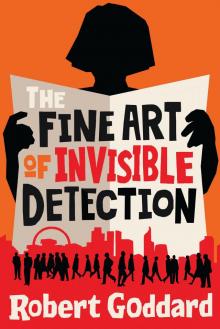 The Fine Art of Invisible Detection
The Fine Art of Invisible Detection One False Move
One False Move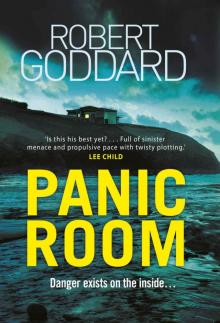 Panic Room
Panic Room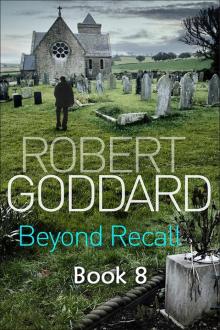 Beyond Recall
Beyond Recall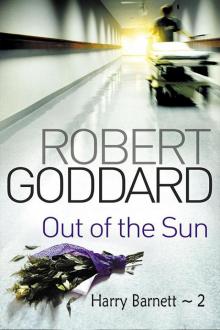 Out of the Sun
Out of the Sun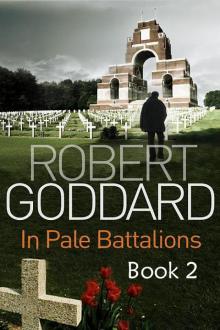 In Pale Battalions - Retail
In Pale Battalions - Retail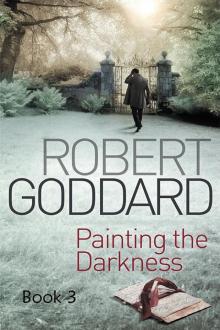 Painting The Darkness - Retail
Painting The Darkness - Retail The Corners of the Globe
The Corners of the Globe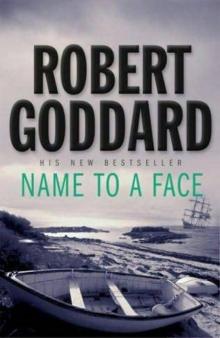 Name To a Face
Name To a Face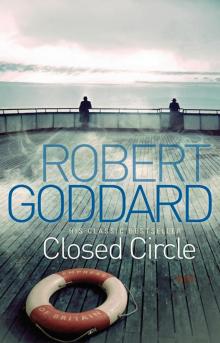 Closed Circle
Closed Circle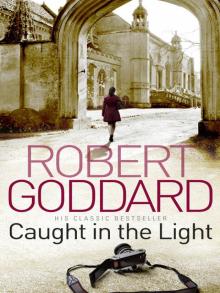 Caught In the Light
Caught In the Light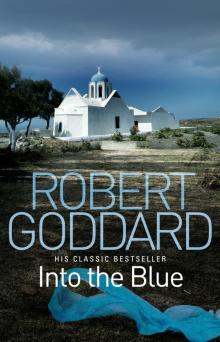 Into the Blue
Into the Blue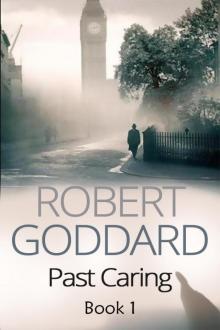 Past Caring - Retail
Past Caring - Retail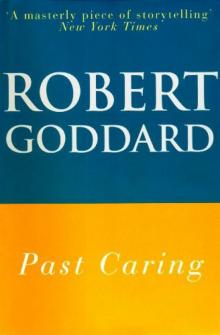 Past Caring
Past Caring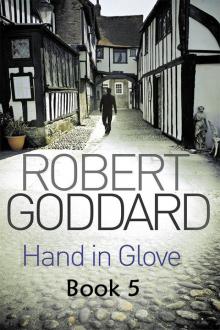 Hand In Glove - Retail
Hand In Glove - Retail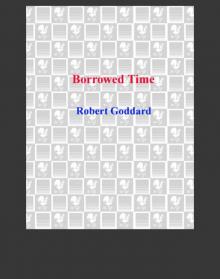 Borrowed Time
Borrowed Time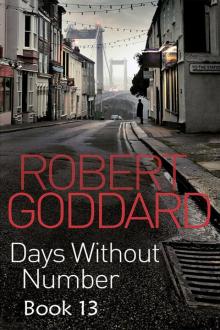 Days Without Number
Days Without Number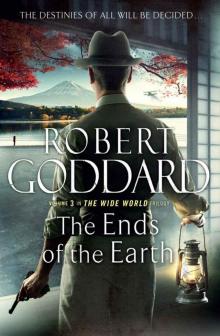 James Maxted 03 The Ends of the Earth
James Maxted 03 The Ends of the Earth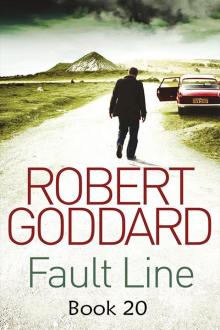 Fault Line - Retail
Fault Line - Retail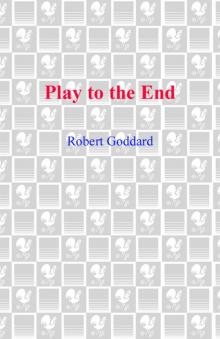 Play to the End
Play to the End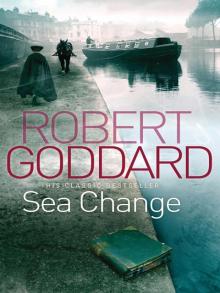 Sea Change
Sea Change Never Go Back
Never Go Back Take No Farewell - Retail
Take No Farewell - Retail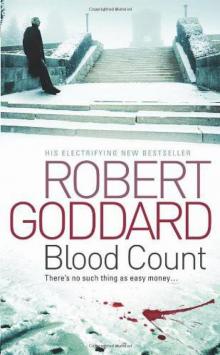 Blood Count
Blood Count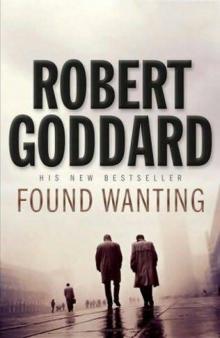 Found Wanting
Found Wanting Sight Unseen
Sight Unseen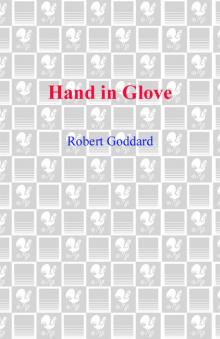 Hand in Glove
Hand in Glove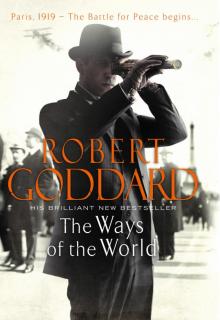 The Ways of the World
The Ways of the World